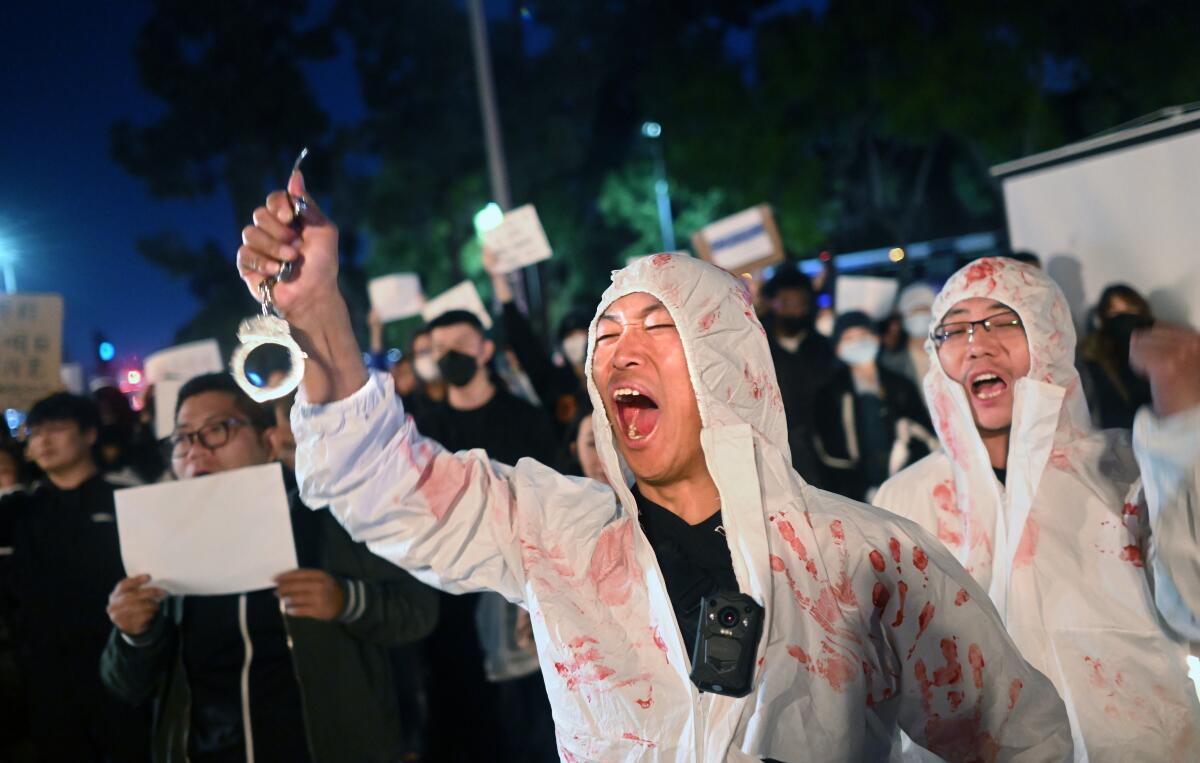Global protests, local ramifications: Why protests in China, Iran and India resonate here

Los Angeles likes to refer to itself as a global city in matters of culture and commerce, but we pay less attention to the cityâs role as a stage for global protest.
Los Angeles County hosts some of the countryâs largest populations of people of Burmese, Cambodian, Chinese, Filipino, Indonesian, Korean, Sri Lankan, Armenian, Salvadoran, Iranian and Arab descent. Which means that international tensions bring protests to our streets and campuses and splash headlines across a panoply of ethnic newspapers and television channels.
So many causes demand our attention that Iâll confess that sometimes they blur together, a constant din of political outrage at events in countries that Iâve never been to, with nuanced histories that Iâll likely never understand.
But the past few months have seen that background noise become a near-constant drumbeat.
In August, a group of Indian American activists faced slurs and violence as they protested against the Hindu far rightâs violence towards Muslims during a celebration of Indian independence day in Anaheim.
In October, there were widespread protests across Southern California over the death of Mahsa Amini, a 22-year-old Iranian woman who was violently detained by the countryâs morality police for allegedly wearing her headscarf improperly and died in custody.
And, most recently, Chinese international students at local universities held candlelight vigils and hoisted blank sheets of paper in support of the A4 protests in China. The protests, which experts called the largest Chinese demonstrations since Tiananmen Square in 1989, were sparked by Chinaâs harsh zero-COVID policies, which many blamed for the deaths of 10 people in an apartment building fire in Urumqi.
It can be hard to see the relevance of protests in the U.S. about international issues. But Western attention and sympathetic activism play an essential role in supporting protest movements abroad.
Jeffrey Wasserstrom, a professor of modern Chinese history at UC Irvine, said thereâs a feedback loop between U.S. attention and international protest. Rallies in the U.S. help prolong protest movements as well as magnify the attention they receive. Especially for people in countries that smother protest movements with censorship and crackdowns, or lack free speech protections, a protest in Los Angeles might be the only possible outlet in which to speak out.
âYou see events happen in one part of the world, and attention fades. But the memory of them is kept alive in another part of the world,â Wasserstrom said.
Ideas travel between diaspora communities like signals bouncing between cellphone towers, and sometimes theyâre transmitted back to the source.
Hereâs one example, according to Wasserstrom. In October, ahead of the Chinese Communist Party congress, a man unfurled a banner over a bridge in Beijing that criticized Chinaâs zero-COVID policies and authoritarian rule. The man and the banner were quickly removed, but the phrases written on that poster have survived in hashtags, posters and protest signs at subsequent rallies held in support. And those same phrases â some of which appeared on posters around UC Irvineâs campus, Wasserstrom said â reappeared in last weekâs protests over Chinaâs policies.
âAttention can really matter in terms of influencing elite behavior, but itâs also important to activists and people suffering to feel that theyâre not forgotten,â Wasserstrom said.
Maansi Shah, 28, a diaspora activist from Palmdale, says it will always be difficult to mobilize people who feel they have no stake in issues abroad. But diaspora activism has been essential to opposing the Hindu far rightâs violent campaign against Muslims. Indian protesters are often labeled seditious and jailed. Sometimes coming to the U.S. is the only way they can continue their work.
Shah says that people are starting to connect the dots between far-right, authoritarian regimes in the Philippines, Brazil and India.
âIf youâre concerned about [former President] Trump, you should be concerned about the rise of the global right broadly,â Shah said. âAnd you might be concerned that your company is matching donations to far-right Indian organizations.â
According to a 2019 Pew Research poll, 53% of U.S. adults say the U.S. should play a greater role in global affairs. But 46% believe we should concentrate on problems at home. Democrats are more likely than Republicans (62% versus 45%) to view global engagement as a positive thing.
But I think supporting international demands for freedom is one of the most American things you can do. In the United States we have the rare privilege to protest, knowing that protest is patriotic and essential to a functioning democracy.
And understanding these global connections helps us see our own city more clearly.
Chinese currency controls affect Southern California home prices. Social and economic success in South Korea affects development in Koreatown and which movies win Oscars. Oppression, corruption and violence in Latin and South America brings immigrants to our borders.
In Los Angeles, weâre constantly reminded that we live in a globalized world. While none of us has the bandwidth to empathize with every cause, itâs important that we listen to those who do.
More to Read
Sign up for Essential California
The most important California stories and recommendations in your inbox every morning.
You may occasionally receive promotional content from the Los Angeles Times.











